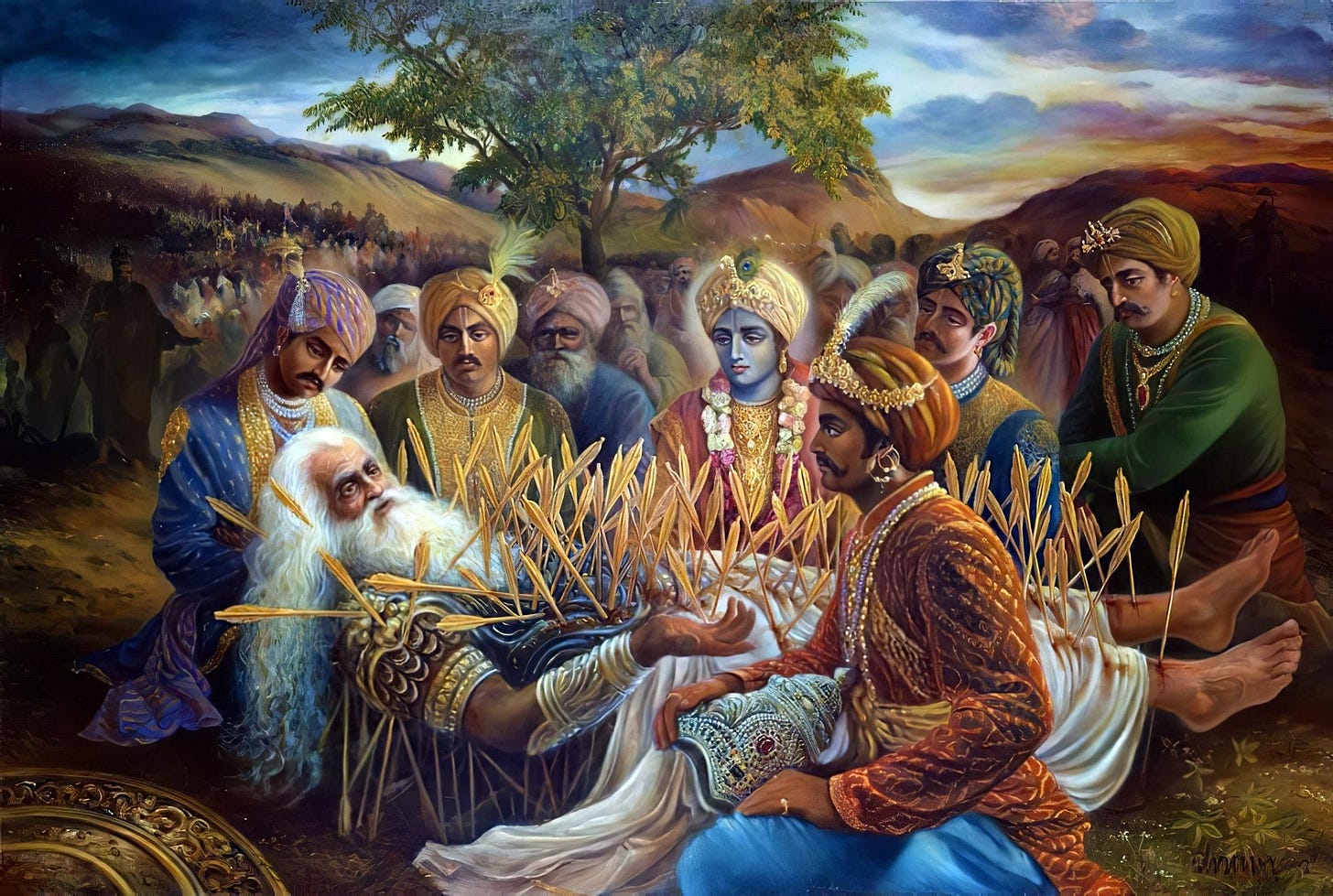Q1: What are his symptoms? (Bg 2.55)
A person fully in Krsna Consciousness is detached from both happiness and distress. He does not have any material affection, and as a result, his consciousness is fully fixed in the self.
« The Song of God: An in-depth study of the Bhagavad-gītā (Volume 1)
Verse 55: śrī-bhagavān uvāca
prajahāti yadā kāmān, sarvān pārtha mano-gatān
ātmany evātmanā tuṣṭaḥ, sthita-prajñas tadocyate
The Supreme Personality of Godhead said: O Pārtha, when a man gives up all varieties of desire for sense gratification, which arise from mental concoction, and when his mind, thus purified, finds satisfaction in the self alone, then he is said to be in pure transcendental consciousness.
In this verse, Krsna answers the first question of Arjuna, describing the symptoms of the sthita-prajña, a devotee in divine consciousness.
a) He gives up all varieties of desire for sense gratification which come from the agitated mind. As a result, he has no material attachment, acting in the platform of service to Krsna, which may include performing his material duties.
b) He becomes purified due to his mental control and spiritual practice.
c) He finds satisfaction in the self, or in other words, he finds happiness in His relationship with Krsna, nourished through his devotional service, and not externally through the senses.
In his purport, Srila Prabhupada adds that a person fully in Krsna Consciousness develops all the good qualities of the demigods, qualities that are absent in a materialist, who, due to the uncontrolled mind, will always act selfishly according to what he believes may gratify his senses. A materialist may act piously because he believes this will bring his future happiness due to good karmic results, he may become a politician or philanthropist, trying to help improve the society of whom he is part, etc. but the ultimate goal is to improve his material position, be it directly, or by collectively improving the conditions of his kind. A pure devotee, on the other hand, is a true philanthropist who selflessly tries to help everyone to find true happiness in Krsna Consciousness.
This mentality of a pure devotee becomes possible only because he gives up the sensual desires of the mind and the idea of a separate material identity that comes due to the influence of the false ego. When we think "I" we may think about the body or the mind, but "I" for a pure devotee means his true identity as a pure soul, an eternal servant of Krsna. Fixed in this identity, the pure devotee observes the desires of the mind as something external, just as we may observe the desires and emotions of a stranger close to us without getting involved. We can do that only when we understand that this is a separate person with whom we have no relationship.
Because the soul is blissful by nature, we always look for satisfaction, but unfortunately, the satisfaction we hunger for is not available here in the material plane. We then look for pleasure in the activities of the senses and the desires of the mind, and this attraction becomes so deeply rooted that it is very difficult to abandon. However, we can give it up when we experience a higher taste in the spiritual platform. Someone who has a pizza does not desire to eat dry bread. As Prabhupada mentions: "one has to engage himself in Kṛṣṇa consciousness without hesitation, for this devotional service will instantly help one onto the platform of transcendental consciousness."
It is not difficult to achieve this platform of spiritual consciousness. Most of us experience it momentarily when we start associating with devotees, visiting the temple, and performing some service to Krsna. The difficulty is in maintaining this platform. Because we are not purified of material desires, we tend to go back to a platform of sense satisfaction after a period of service, and from there alternate between them. When we finally decide to stay on the spiritual side, our advancement becomes quicker. As Prabhupada mentions: "The highly developed soul always remains satisfied in himself by realizing himself as the eternal servitor of the Supreme Lord. Such a transcendentally situated person has no sense desires resulting from petty materialism; rather, he remains always happy in his natural position of eternally serving the Supreme Lord."
In short, the answer to Arjuna's first question, "What are his symptoms?" is that a person fully in Krsna Consciousness is detached from both happiness and distress. He does not have any material affection, and as a result, his consciousness is fully fixed in the self.
Main points in the purport of Srila Prabhupada:
"The Supreme Personality of Godhead said: O Pārtha, when a man gives up all varieties of desire for sense gratification, which arise from mental concoction, and when his mind, thus purified, finds satisfaction in the self alone, then he is said to be in pure transcendental consciousness."
a) To advance, one has to give up all kinds of material desires coming from the whims of the material mind. It is not possible to artificially stop such desires, but when one becomes fully engaged in Krsna Consciousness, the desires subside without separate effort. As a result, a devotee automatically develops all good qualities as he advances in spiritual life.
b) In the material platform there are always many hankerings and frustrations, but a person advanced in Krsna Consciousness always remains satisfied, seeing himself in his eternal position as the eternal servant of the Lord. In this transcendental consciousnesses, material desires become insignificant and one completely loses interest in them.
« The Song of God: An in-depth study of the Bhagavad-gītā (Volume 1)


